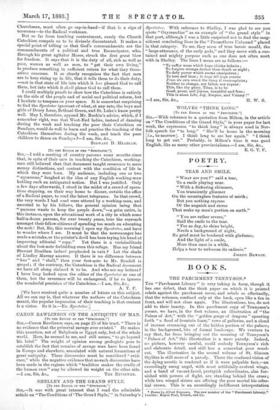SHELLEY AND THE GRAND STYLE.
[To THE EDITOR OF THE "SPECTATOR."] SIR,—It was with great interest that I read the admirable article on "The Conditions of 'The Grant Style,'" in Saturday's Spectator. With reference to Shelley, I was glad to see you quote " Ozyreandias " as an example of "the grand style" in that poet, although I was a little surprised not to find the mag- nificent concluding lines in the "Prometheus Unbound" placed in that category. To me, they seem of true heroic mould, the "large utterance, of the early gods," and they move with a sus- tained and mighty purpose such as one does not often meet with in Shelley. The lines I mean are as follows :— " To suffer woes which hope thinks infinite ; To forgive wrongs darker than death or night; To defy power which seems omnipotent ; To love and bear ; to hope till hope creates From its own wreck the thing it contemplates; Neither to change, nor falter, nor repent : This, like thy glory, Titan, is to be
Good, great, and joyous, beautiful and free ; This is alone Life, Joy, Empire, and Victory"


































 Previous page
Previous page